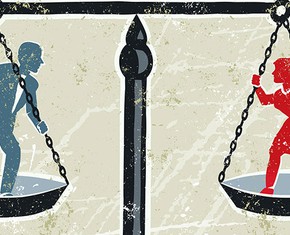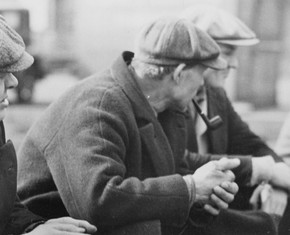The views expressed in our content reflect individual perspectives and do not represent the authoritative views of the Baha'i Faith.
The rise of the global feminist movement, and the accession of more and more women to positions of prominence and power in the world, did not take place without a long, difficult struggle.
When women in the Western world achieved universal suffrage – which many nations still have yet to accomplish — they did so despite virulent opposition from men. When women first attempted to study in institutions of higher learning, they did so in spite of widespread male criticism and hostility. When women made significant inroads into the paid workforce, they did so in defiance of the masculine status quo. When women were finally granted the right to enter into contracts and own property, it required another protracted fight against the laws of male-dominated court systems.
RELATED: Big Boys Don’t Cry: Questioning Traditional Masculine Ideology
Historically, that feminist fight for women’s rights has always required grit, dedication, courage, and perseverance in the face of fierce male privilege and strong opposition.
In a fascinating way, the origins of the word feminist, which the Oxford English Dictionary says first came into use in 1852, almost exactly parallel the beginnings of the Baha’i Faith and its foundational principle of gender equity. Perhaps that’s no coincidence, as Abdu’l-Baha explained in this 1913 speech he gave in Paris:
In the world of humanity … the female sex is treated as though inferior, and is not allowed equal rights and privileges. This condition is due not to nature, but to education. In the Divine Creation there is no such distinction. Neither sex is superior to the other in the sight of God. Why then should one sex assert the inferiority of the other, withholding just rights and privileges as though God had given His authority for such a course of action?
Since the Baha’i teachings so clearly and completely assert the equality of men and women, and have done so since the very beginnings of the Faith in the mid-19th century, Baha’is all over the world have had a hundred and eighty years of experience in raising their children on equal terms. Educating and training Baha’i girls has led them to a very high level of accomplishment, which has, in turn, impelled and encouraged Baha’i boys to try to match their sisters’ and their mothers’ achievements. In the ensuing generations, well-educated mothers have then raised even more accomplished girls — and boys. That strong focus on educating girls has raised the level of education and accomplishment for everyone.
This new standard of equality, where boys and girls have the same school curriculum, the same course of study, the same expectations and the same opportunities, helps diminish and eventually do away with the societal problem of male privilege. That syndrome — the traditional expectation that maleness is the social norm, and femaleness is not – supports the patriarchal nature of society and over-empowers men, leading them to believe that they always possess the right to be right.
The global Baha’i community’s experience has led to a significant realization: male privilege harms males, just as racism also harms racists. Antiquated gender roles, and the inequitable outcomes they promote, make boys into men who assume they will always be dominant – that they can safely discount and demote half of the population.
So when societies promote male privilege it contributes to a sense of entitlement, which not only perpetuates systemic bias that damages girls and women, but also negatively affects the development of boys. Any un-earned accolade, reward, or recognition, as most educators will testify, can lead to an inflated, inauthentic sense of self and self-esteem. Eventually, as a boy grows to adulthood, that lack of authenticity often gives rise to a diminishing reservoir of male self-worth, an inner conviction of falseness and unearned, counterfeit accomplishment.
Eradicating a sense of male privilege in boys, even when it permeates the society they grow up in, can offer them the gift of real, true accomplishment in their lives. Rather than the un-earned academic distinction or the promotion or the recognition that comes from privileging the masculine, equality can bring boys a lasting sense of genuine attainment and fulfillment, as Abdu’l-Baha pointed out:
The world of humanity consists of two parts: male and female. Each is the complement of the other. Therefore, if one is defective, the other will necessarily be incomplete, and perfection cannot be attained. There is a right hand and a left hand in the human body, functionally equal in service and administration. If either proves defective, the defect will naturally extend to the other by involving the completeness of the whole; for accomplishment is not normal unless both are perfect. If we say one hand is deficient, we prove the inability and incapacity the other; for single-handed there is no full accomplishment. Just as physical accomplishment is complete with two hands, so man and woman, the two parts the social body, must be perfect. It is not natural that either should remain undeveloped; and until both are perfected, the happiness of the human world will not be realized.
RELATED: What Does It Take to Be a Man Today?
Few boys or girls really want to attain anything unfairly. When bias or prejudice or lack of equality produces unfairness, un-earned privilege produces unfair expectations. In many cultures, we expect that men will be financially successful, professionally accomplished, and physically strong. Any man falling short of those unfair expectations becomes something less than the society’s male privilege will countenance, and often gets branded a failure as a result. Those unrealistic expectations, driven by unhealthy privilege and stereotypical male gender roles, often cause boys and men to strike out against others or become self-destructive.
That may help explain why homelessness, substance use disorders, mental illness, criminal behavior, mass shootings, and imprisonment all disproportionately occur among men.
So if you want to raise boys who become authentic, satisfied, and happy adults, you’ll definitely want to make sure they understand they’re equal to girls, and girls are equal to them. You’ll want to impress upon your males that treating females equally makes them true and authentic beings. As Abdu’l-Baha said in Paris, “When men own the equality of women there will be no need for them to struggle for their rights!”
















Comments
Sign in or create an account
Continue with Googleor